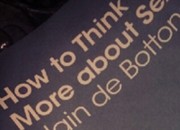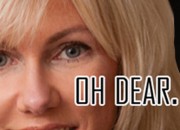Jonathan Denby, who has owned the hotel for ten years, knows that it is inappropriate to have a religious book in a diverse, largely secular world, not to mention a little bit rude to place it right into people’s bedrooms. He’d been thinking about this for a while and initially considered replacing it for Ayn Rand’s “Atlas Shrugged” (goodness!), but seeing that everyone was going crazy about E.L. James’ “Fifty Shades of Grey,” he decided to go with the erotica novel instead even though he himself has not read it.
Books
The message of Alain de Botton’s How To Think More About Sex is: Sex is a problem we have to suffer, but it’s not our problem. Our parents and childhoods did it to us and we can’t really do anything about it, so, you know, whatever. It’s bad and corrosive anyway, so let’s not even worry about it. We can get a therapist to come every Friday night at dinner time to help us maybe do it once a week so nothing bad happens to our relationship, which we don’t care that much about anyway, since our partners are starting to remind us of our parents.
Zak’s original field, it turns out, is economics, a far cry from the hearts and teddy bears we imagine when we consider his nickname. But after performing experiments on generosity, Zak stumbled on the importance of trust in interactions, which led him, rather inevitably, to research about oxytocin. Oxytocin, you might remember, is a hormone that has been linked previously to bonding — between mothers and children primarily, but also between partners.
Mistresses are under represented in non-fiction for good reason — they’re the home-wreckers, the sluts, the tramps. It’s no easy thing to make readers sympathetic to you when you decide to take a machete to someone else’s family. Mimi Alford proved that keeping the secret for decades before dishing is a good start. But if Alford’s memoir is a guide offering suggestions on how to do this the right way, Rielle Hunter’s new memoir about her affair with disgraced presidential hopeful John Edwards is the opposite.
At the same time, the hard data makes clear just how much more effective the Dutch strategy has been. Sexually active teens in the Netherlands are, as Schalet shows, much more likely to use contraception than their American counterparts. Rates of teenage pregnancy and abortion are also substantially lower.
A little book about sex inspired by Dr. Seuss is making the internet rounds. Before you panic, allow us to remind you that this is not a book being handed out on street corners to children, but one that resides online with so little SEO as to render it impossible to stumble upon unless someone has a direct link. Having gotten that out of the way, allow us to introduce you to “Now That You’re Big” by Simon Greiner.
The combination of these ideas, commonly present in young adult literature, perpetuate slut- and prude shaming and feed into a culture that victimizes sexual predators and guilts victims of sexual abuse. Literature imparts lessons and it is impossible to expect teenagers to grow into sexually healthy adults if writers continue to perpetuate damaging concepts.
We’re all familiar with the fireworks of passion decreasing as people settle in to being together, but did you know there is an actual name for this? According to Sheril Kirshenbaum, author of “The Science of Kissing,” it’s called “The Coolidge Effect” — and yes, that “Coolidge” refers to U.S. president, Calvin Coolidge.












